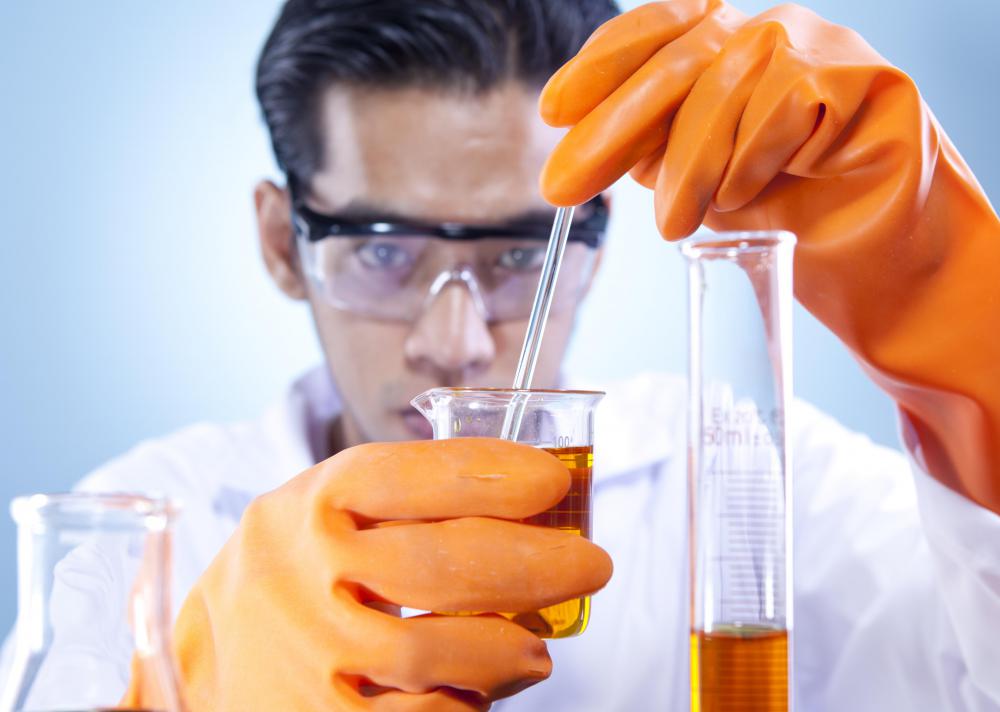At PracticalAdultInsights, we're committed to delivering accurate, trustworthy information. Our expert-authored content is rigorously fact-checked and sourced from credible authorities. Discover how we uphold the highest standards in providing you with reliable knowledge.
How do I get a PhD in Chemistry?
The Doctor of Philosophy (PhD) is typically the highest level of educational achievement that can be completed in any given field. To receive a PhD in chemistry, you should begin your studies by pursuing a four-year degree, such as a bachelor’s degree, in chemistry or a related field. You will then need to receive your master’s degree or begin a program that offers a master’s degree as you progress toward your PhD in chemistry. There is a fairly intense amount of coursework you will need to complete during your PhD program, and you will likely need to pass several examinations and finally prepare, present, and defend your doctoral dissertation.
To receive a PhD in chemistry, you will need to begin by completing an undergraduate program, such as a bachelor’s degree, and should consider focusing on chemistry or a specific branch of chemistry. This will help lay the groundwork for the rest of your education and can help give you access to people and knowledge that will be important as you progress. You will then want to either pursue a master’s degree in chemistry or a related field, or find a school that offers a single program that will award you a master’s degree as you work toward your PhD in chemistry.

It can be helpful to look into the specific requirements of various PhD and master’s degree programs as you work on your four-year degree. This will allow you to take the classes you need, as well as any tests and examinations, and apply before any deadlines the schools may have. You might need to take the Graduate Records Examinations (GRE) before applying to graduate programs, and international students may need to prove English proficiency by taking the Test of English as a Foreign Language (TOEFL).

Once you are accepted into a program that will ultimately award you a PhD in chemistry, you will need to complete some potentially rigorous coursework. This usually involves two to three years of classes and other programs, and may also include several semesters of teaching or working as a teacher’s assistant. Depending on the school, you might also need to complete certain examinations as you work toward your PhD, and specific schools can provide you with more details on the tests they require. You should also consider selecting a specific area of chemistry to focus on, such as biochemistry or organic chemistry.

All of your coursework, study, research, and work are usually spent as a way to develop and work on your final doctoral dissertation. The dissertation is a piece of work, usually a paper that is appropriate for publication, that presents an original idea or finding that you have come up with through your research and study. You will typically have to present this dissertation to a panel of experts in the field and professors, as well as other students, and potentially defend your work before them. Once you have done this to the satisfaction of your dissertation adviser and completed your other coursework, you are then typically awarded your PhD in chemistry.
AS FEATURED ON:
AS FEATURED ON:













Discussion Comments
You don't need a Master's degree to pursue a PhD in chemistry. Getting a Master's and then pursuing a PhD in the same field at another college/university will be more of a hindrance because you have to start over with taking classes and a whole new thesis for your doctorate.
I'm a first year chemistry graduate student in a PhD program with only a BS degree.
Post your comments